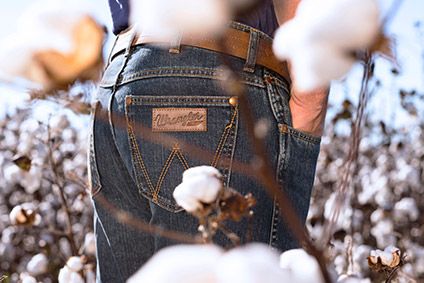"In order to improve soil health, Wrangler works with scientists and specialists to implement techniques such as no-till, cover crops, and crop and grazing rotations to supplement organic matter and microbial organisms in the ground. These practices lead to higher yields for farmers and reduce associated carbon emissions"
 Having realized environmental and social stewardship as a key to success, denim brand Wrangler aims to reduce its environmental impact of its apparels by creating a cradle to cradle supply chain. The brand is investing a huge amount of capital to decipher new ways to improve soil health, water usage and dying techniques, and to nurture the next generation of farming.
Having realized environmental and social stewardship as a key to success, denim brand Wrangler aims to reduce its environmental impact of its apparels by creating a cradle to cradle supply chain. The brand is investing a huge amount of capital to decipher new ways to improve soil health, water usage and dying techniques, and to nurture the next generation of farming.
In order to improve soil health, Wrangler works with scientists and specialists to implement techniques such as no-till, cover crops, and crop and grazing rotations to supplement organic matter and microbial organisms in the ground. These practices lead to higher yields for farmers and reduce associated carbon emissions. They also help preserve natural habitats and biodiversity.
Wrangler also shares its internal findings with future leaders. Recently Wrangler held a Land Stewardship Conference for students at its Greensboro headquarters in partnership with the National Future Farmers of America, North Carolina, and the USDA’s National Resources Conservation Service (NRCS).
Initiatives to reduce negative impact of cotton
Besides improving soil health, Wrangler is also committed to reducing the negative impact of cotton industry. For this, it has started a sustainable cotton coalition in 2017. The coalition includes partners such as Cotton Inc., Soil Health Institute, the E3 growing platform, Field To Market, Texas Alliance for Water Conservation, The Nature Conservancy, North Carolina State University, the NRCS, among others. This helps Wrangler to produce more sustainable cotton. In 2020, the company aims to help cotton farmers to implement these best practices across soil health, water management, etc. 
Wrangler is also an active member of the Better Cotton Initiative (BCI), which works to improve environmental and social practices in the global cotton industry. The Wrangler and its partner brand, Lee purchased around 8,000 mt of BCI-certified cotton in just two years. And by 2025, it has plans to reduce the impact of primary materials 35 per cent.
Water conservation technologies
Meanwhile Wrangler is also implementing water-conservation technologies in its manufacturing plants. The brand aims to reduce water consumption by 20 per cent at all finishing facilities by 2020. This will be achieved by implementing techniques such as changing the way it applies detergent in the finishing process. The company also uses efficiency measures such as water pressure and fixture best practice, and is working on water recycling and cleaning strategies such as microorganism filtration. These practices led to some of its manufacturing facilities using 45 percent recycled water.
Innovative sustainable dyeing solutions
Wrangler also leverages its position to create innovative sustainable dyeing solutions. And is also exploring foam dyes in partnership with Texas Tech University and Tejidos Royo. For this, it is collaborating with Stony Creek Colors, which uses natural indigo dyes. The brand uses Stony Creek Colors’ natural indigo in its 27406 collection and plans to explore further collaboration. Such environmentally conscious innovation not only improves its sustainability profile, it also advances its brand image and bottom line.
Guiding its business through these sustainability initiatives, Wrangler aims to drive long-term growth for the company in a marketplace that demands truly responsible practices.












